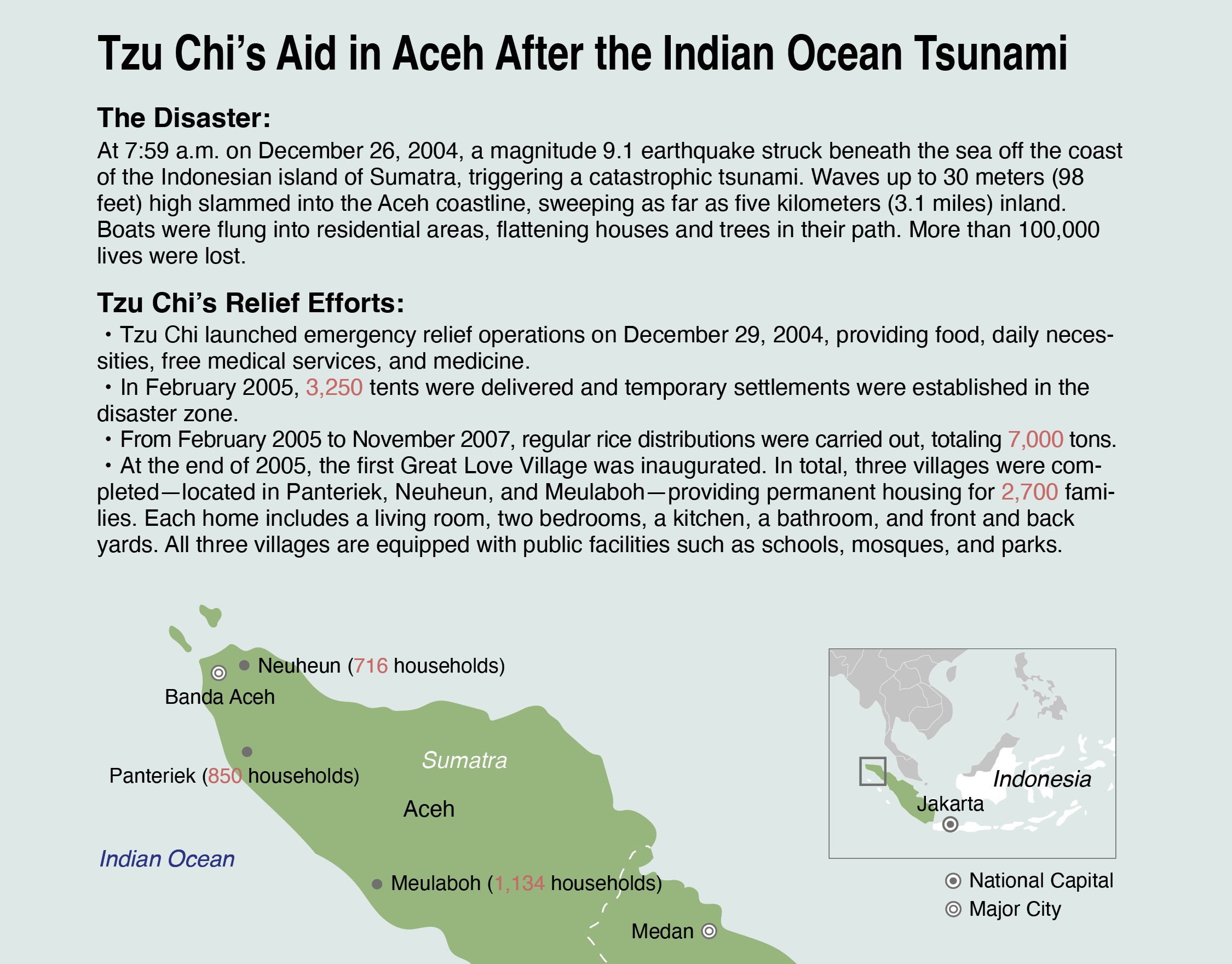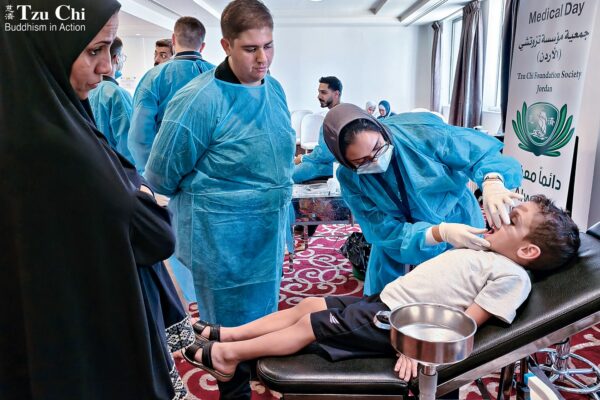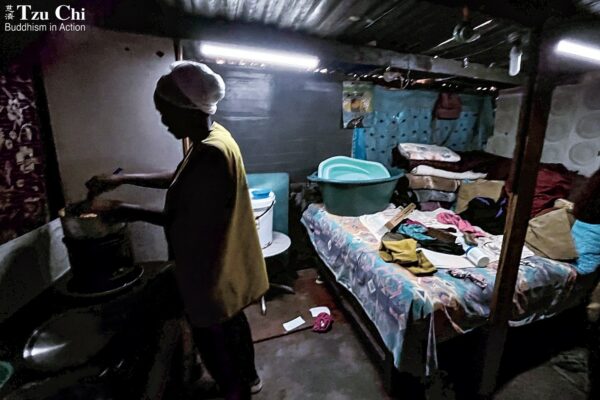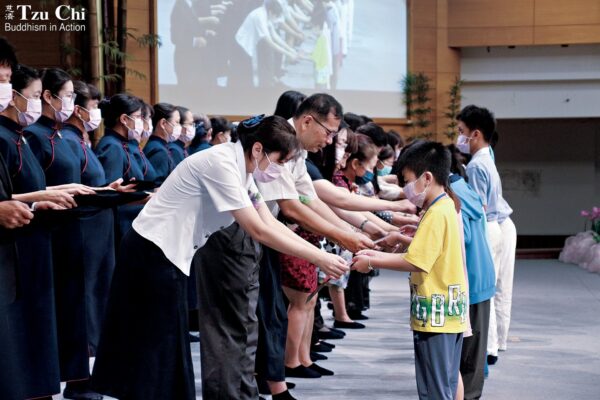Text provided by Tzu Chi Indonesia
Edited and translated by Wu Hsiao-ting
Photos by Arimami Suryo Asmoro
Two decades after the Indian Ocean tsunami devastated Aceh, Indonesia, the memories of loss linger. Yet its people have risen with resilience, grateful for their second chance at life.
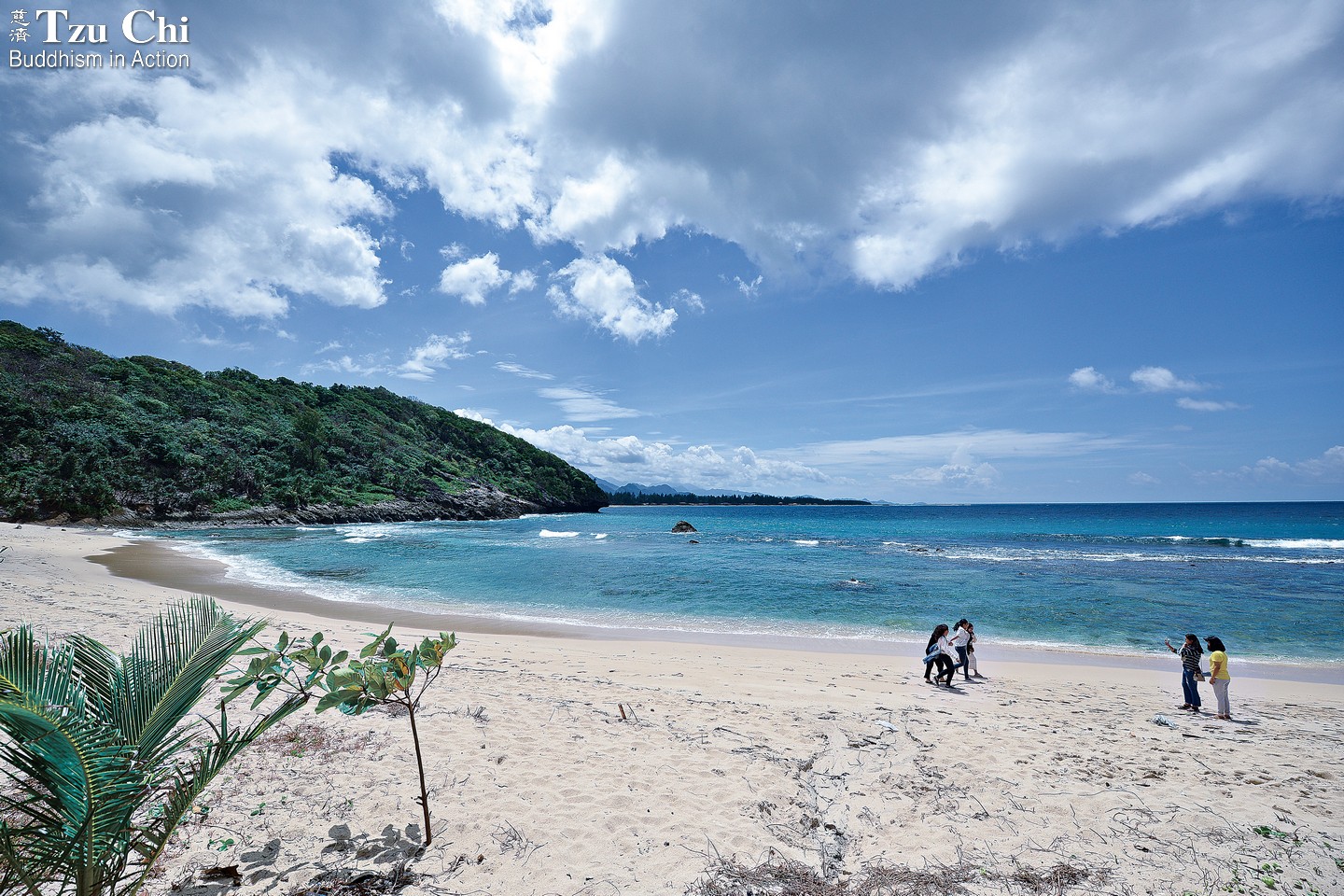
Lampuuk Beach in Aceh, on Indonesia’s Sumatra Island, was hit hard by the tsunami 20 years ago. Today, it once again draws tourists.
Just 20 kilometers (12 miles) from Banda Aceh in Indonesia’s Aceh Province, Lampuuk Beach offers a tranquil escape. Framed by emerald hills and bordered by shimmering blue-green waters, its breathtaking beauty attracts visitors from near and far.
But beneath this serenity lies the memory of profound loss. On December 26, 2004, a magnitude 9.1 earthquake struck beneath the Indian Ocean off the coast of Aceh, unleashing a massive tsunami that devastated the region. Towering waves swept across the coast, demolishing homes and hotels. Half the residents of Lampuuk village perished in the disaster.
Not far from Lampuuk, in the village of Lampulo, a fishing boat hurled inland by the tsunami came to rest atop a house. In the midst of the disaster that day, dozens of people scrambled aboard to escape danger. The boat saved 59 lives. Preserved by the Banda Aceh city government, the boat stands today as a solemn memorial.
The tsunami claimed more than 100,000 lives in Aceh alone. For years, the trauma kept survivors away from Lumpuuk Beach. But over time, with healing and reconstruction, life gradually began to return to normal. Tourism also revived, bringing renewed hope to the community. Two decades after the disaster, the landscapes once scarred by the catastrophe have become symbols of resilience, strength, and renewal.
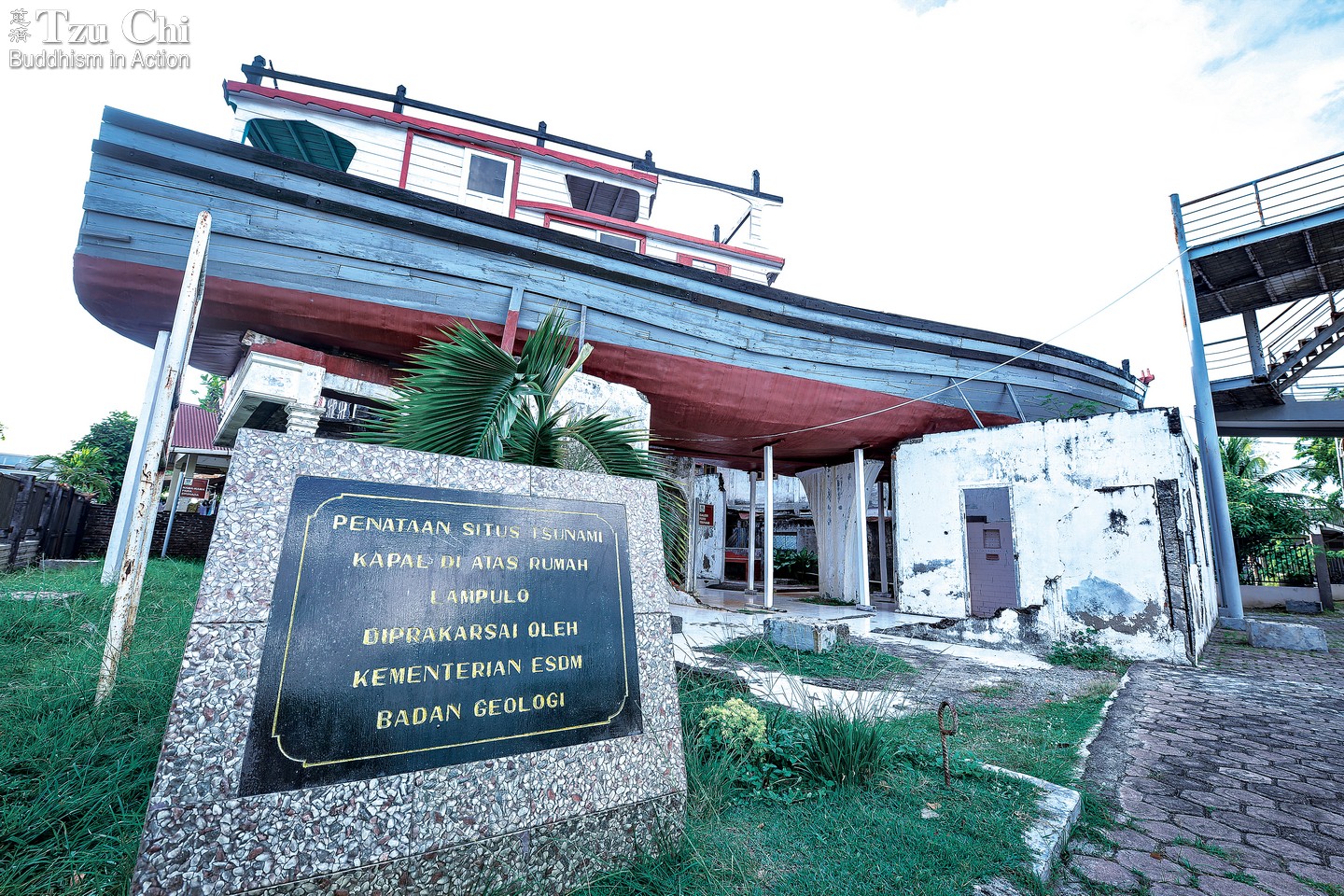
Swept onto the roof of a house by the tsunami, this fishing boat saved 59 lives and is now an educational site.
Arriving two days later
In late December 2004, Sugianto Kusuma (郭再源), Deputy CEO of Tzu Chi Indonesia, was vacationing in Shanghai, China, with his family when he received a call from Tzu Chi’s headquarters in Hualien, Taiwan: a massive tsunami had struck Aceh. He rushed back to Jakarta, Indonesia’s capital, and immediately mobilized volunteers to coordinate emergency relief. At the time, Tzu Chi Indonesia’s CEO, Liu Su-mei (劉素美), was in Taiwan visiting her parents. She, too, returned to Jakarta without delay.
Emergency meetings ran from morning until night. By December 28, just two days after the disaster, the first team of volunteers was ready to depart. At 4 a.m., 11 volunteers, including three doctors, gathered at Halim Perdanakusuma International Airport in Jakarta. Their aircraft was loaded with 12 tons of relief supplies, including food, blankets, and medicine. Because Aceh’s telecommunications were still down and larger planes couldn’t land, Kusuma had arranged for a Fokker 50—a small civilian plane—to make the trip.
When the Tzu Chi team arrived at Sultan Iskandar Muda International Airport, 13.5 kilometers (8.4 miles) southeast of Banda Aceh, they were met with a somber scene. Survivors, barefoot and desperate, ran toward the airport. “One man hadn’t eaten in two days and had walked half a day just to get there,” Kusuma recalled. “He told us that people were fleeing, afraid that rebel forces would take advantage of the chaos to loot.”
Many survivors from Aceh had taken refuge in Medan, in neighboring North Sumatra. Tzu Chi volunteers there quickly mobilized as well, setting up aid stations and preparing relief distributions.
Just before the tsunami struck, then-President Susilo Bambang Yudhoyono had been in Nabire, Papua, the easternmost province of Indonesia, inspecting the aftermath of an earlier earthquake. Upon hearing of the disaster in Aceh, he and then-Minister of Social Affairs Bachtiar Chamsyah, who was familiar with Tzu Chi’s humanitarian work, flew immediately to the affected area.
The presidential aircraft was less advanced than today’s models and required refueling stops in Makassar and Batam. It landed that evening in Lhokseumawe, Aceh. The city lay in ruins. Coconut trees were flattened, and bodies were strewn across the landscape. The presidential team flew on to Banda Aceh the next morning. From the air, the devastation stretched as far as the eye could see; entire neighborhoods had been reduced to a wasteland.
After landing, Minister Chamsyah saw the Tzu Chi volunteer team. Their faces were heavy with grief, overwhelmed by the scale and severity of the disaster. Deputy CEO Kusuma reported to the president, “Mr. President, we arrived this morning. Some supplies have already been moved into storage, and more are on the way.” He also shared plans to set up temporary tent shelters for displaced families.
The president asked, “How many permanent houses do you plan to build?”
“We will be there to help whether it’s 1,000 or 2,000,” Kusuma replied earnestly.
Tzu Chi volunteers joined the presidential convoy as it toured the disaster zone. At one point, the convoy came to an abrupt halt. Following the president’s lead, Kusuma and the others stepped out of their vehicles. Ahead of them lay an open field, filled with bodies. The president asked everyone to pause and offer a silent prayer for the victims.
“Even today, I can’t forget what I saw,” Kusuma recalled. “Bodies were everywhere along our route. We truly witnessed the overwhelming power of nature. Humanity is powerless in the face of such force.”
Tzu Chi built three Great Love Villages for families affected by the tsunami in Aceh. The entire process—from screening residents to construction and final move-ins—spanned more than four years. The largest village, located in Meulaboh, became home to around 1,100 families.
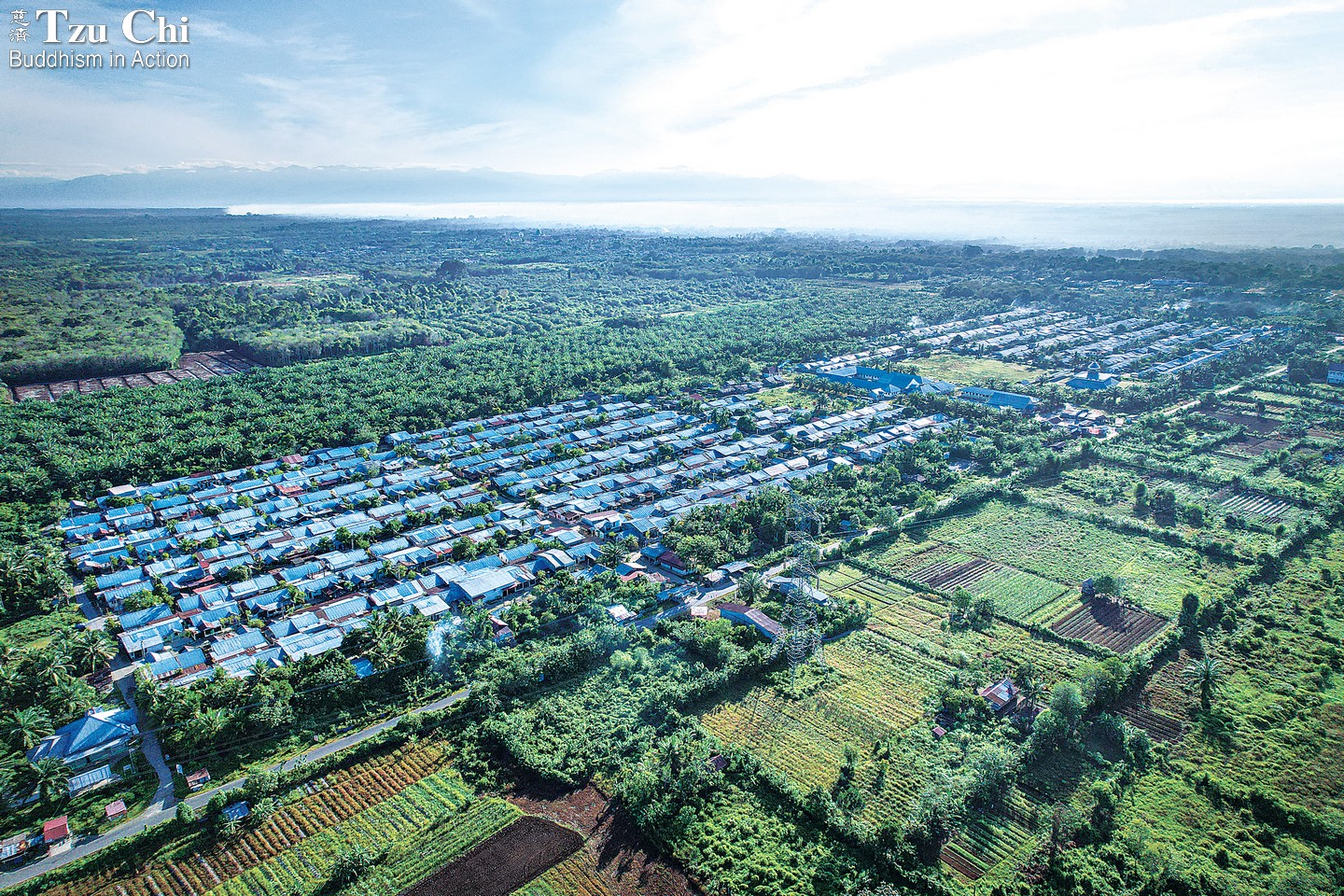
Five years of commitment
In the early stages of its disaster response, Tzu Chi Indonesia set up a coordination center in Jakarta, a logistics base in Medan, and began aid distributions in Banda Aceh. It also launched a three-phase relief plan to support Aceh’s recovery. The short-term phase focused on providing emergency aid and medical services; the mid-term phase involved establishing tent settlements to shelter displaced residents; and the long-term phase centered on constructing permanent housing communities—known as Great Love Villages—in three locations: Panteriek in Banda Aceh, Neuheun in Aceh Besar, and Meulaboh in West Aceh.
Many male volunteers recalled how, during their first visits to the disaster zone, they helped carry bodies from houses and along the coastline. “Those volunteers endured a lot,” said Liu Su-mei. “Some returned to Jakarta with the smell still clinging to their clothes.”
Female volunteers also played a vital role, providing culinary and other support, some even staying for months at a time. “Their contribution was invaluable,” Liu said. “While the male volunteers carried out their work on the front lines, our Tzu Chi sisters ensured everyone had warm meals waiting.”
Liu also expressed deep gratitude to the volunteers from Medan and Jakarta who continued traveling to Aceh over a five-year period to care for survivors. “Brother Sarpin Lie [李彬光], who lives in Jakarta, oversaw the construction of the Great Love Villages,” she said. “He made more than 60 trips to Aceh.”
Why did Tzu Chi volunteers spend five years helping residents in Aceh? Liu explained, “It wasn’t just about building homes and moving people in—we also helped establish community management. We even assisted with the legal process of transferring land titles from the government to individual families. It was a long journey.”
Tzu Chi also organized free medical clinics in the disaster zone. Because many foreign organizations were unfamiliar with local customs, medical teams from several countries eventually entrusted their medications and supplies to Tzu Chi. “Most people in Aceh are Muslim and tend to be conservative,” Liu explained. “Many of our Tzu Chi International Medical Association doctors were also Muslim, and we provided medication instructions in Indonesian, which helped put local residents at ease.”
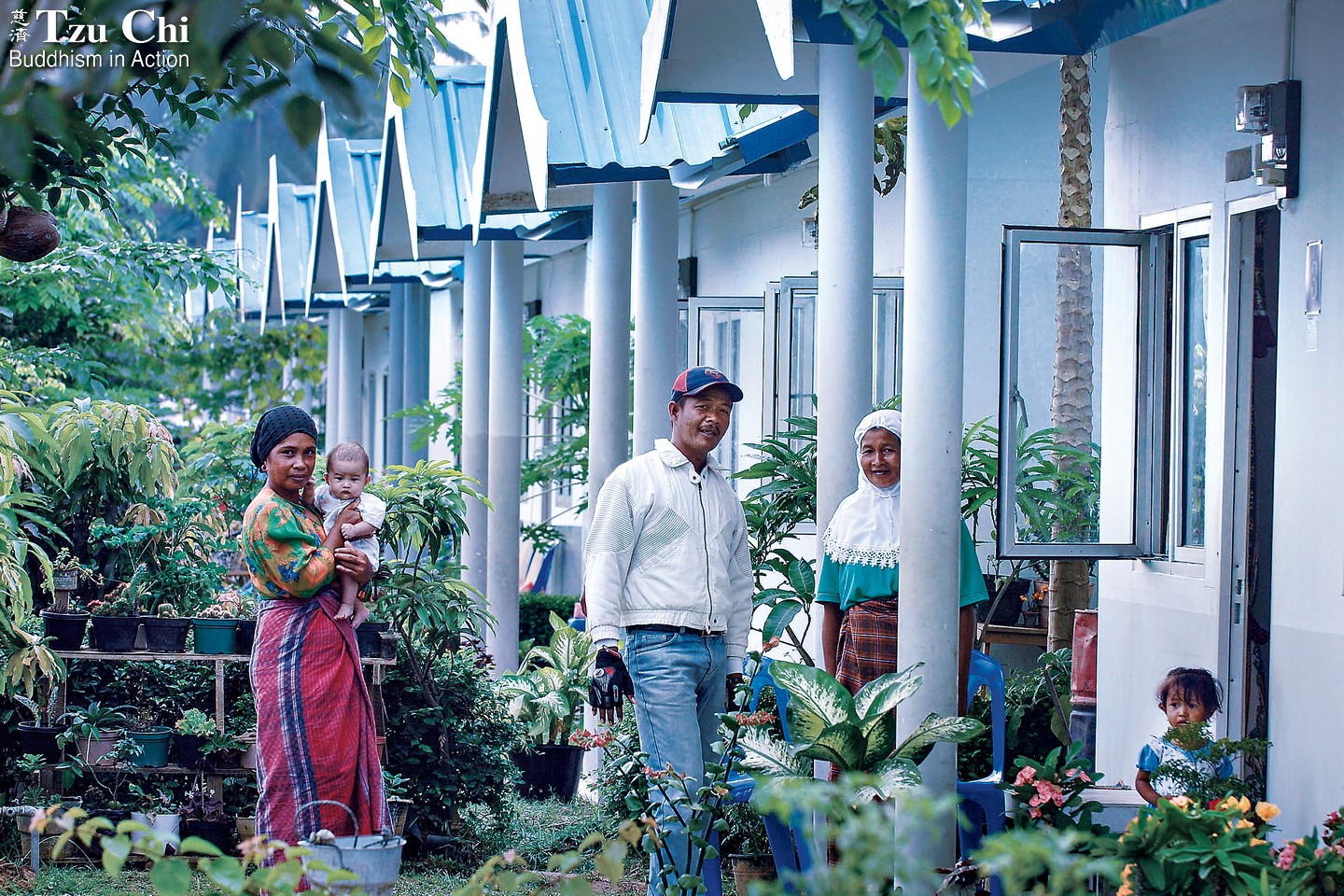
Each Great Love home measures about 120 square meters (1,290 square feet) and includes a living room, two bedrooms, a kitchen, and a bathroom. The front and back yards provide space for residents to beautify their surroundings, fostering a lush, green environment. Yan Lin-zhao
Peace brought by disaster
In 2003, Tzu Chi Indonesia had launched a nationwide distribution of 50,000 tons of rice. Aceh was among the regions that benefited. The Free Aceh Movement was still active then, and the region was marked by social unrest, making relief work especially challenging. “The rebels knew Tzu Chi was there to help the people,” said Liu Su-mei, “so they cooperated with us. Whenever they saw a Tzu Chi convoy, they let it pass.”
By the end of 2005, the housing village built by Tzu Chi in Panteriek was completed. Among its residents were former rebels who had also been affected by the disaster. “As long as someone is a survivor, we should help them, regardless of their background,” Liu said. She is heartened to see how former rebels and other villagers are living today peacefully side by side in the community.
Muzakir Manaf, a former commander of the Free Aceh Movement, lost seven family members in the tsunami. He witnessed Tzu Chi’s compassion firsthand. “If people sincerely help us,” he said, “we should sincerely be grateful—not stand in their way. We are truly thankful to Tzu Chi for coming to Aceh.”
Safrizal Z.A., who recently stepped down as acting governor of Aceh, remarked that the region had long been mired in conflict prior to the tsunami. But the disaster, he said, seemed to awaken Aceh to the realization that peace is the best path forward. “The clearest proof of that came on August 15, 2005, when the Indonesian government and the Free Aceh Movement signed the Helsinki Peace Agreement,” he observed. “In a way, the people of Aceh discovered an unexpected path to peace through the tragedy.”
Despite that positive outcome, he noted that even though 20 years have passed since the disaster, the people of Aceh still carry deep and complex emotions. “The sorrow caused by the disaster remains,” he said. “When people think of loved ones lost, they can’t help but shed tears. Perhaps that wound will never fully heal.”
Aid poured in from 60 countries and hundreds of organizations after the catastrophe to help Aceh recover—something the people of Aceh will never forget. Among those who reached out was Tzu Chi. “We are deeply moved and sincerely grateful for the love and care Tzu Chi showed residents in Aceh,” said Safrizal. “When the situation was still unstable and many organizations hesitated to enter the region, Tzu Chi was the first to step in and offer help.”
What impressed Safrizal most was that Tzu Chi not only provided physical aid, but did so with compassion and care. “The houses Tzu Chi built were made with top-quality materials, designed to meet high earthquake-resistance standards, and thoughtfully planned for the comfort of the residents,” he said.
Today, the legacy of that compassion lives on. Most residents of the houses built by Tzu Chi have preserved their original appearance and kept them in good condition—a testament to the quality of the materials and construction. Some residents, with improved financial circumstances, have added extensions, while others have converted part of their homes into storefronts to run small businesses. What began as a relief effort has become a solid foundation for new beginnings.
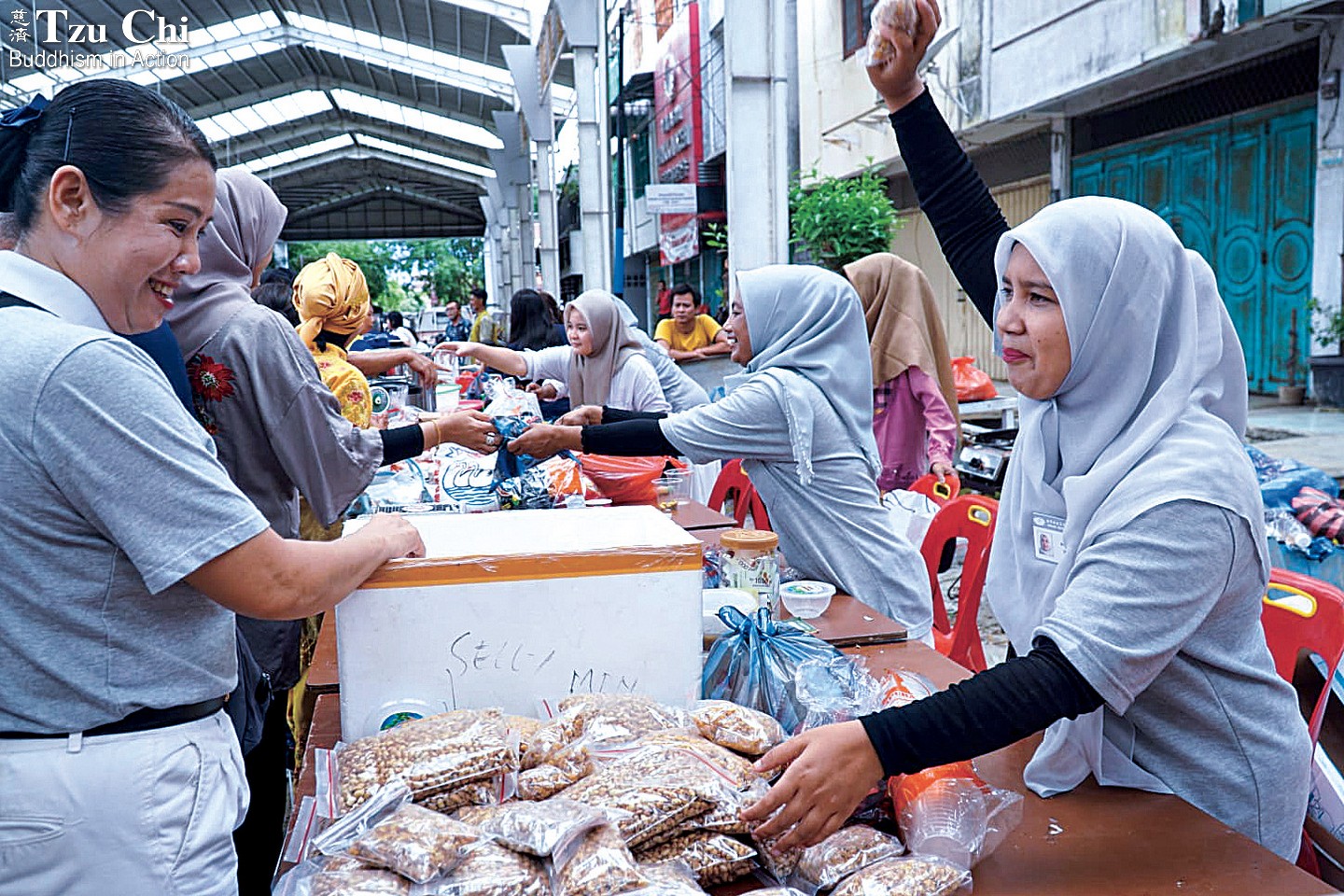
Rina Gustiana (right), who moved into the Great Love Village in Panteriek in 2006, is now a Tzu Chi volunteer. In this photo, she and fellow residents participate in a charity bazaar. Courtesy of Tzu Chi Indonesia
A cycle of goodness
Medan lies more than a hundred kilometers (62 miles) from Aceh. Even after the completion of the Great Love Village project, Tzu Chi volunteers from Medan have continued to travel to Aceh to carry out aid distributions and free clinics, promote recycling, and conduct volunteer training. Moved by the support Tzu Chi provided after the tsunami and inspired by the dedication of its volunteers, more than 150 Aceh residents have joined Tzu Chi. They now serve across ten regions in the province, including Banda Aceh, Neuheun, Meulaboh, and Lhokseumawe.
Volunteer Supandi (彭文窗), who relocated from Jakarta to Aceh after the tsunami, hopes to see Tzu Chi volunteers in every community, so that help can be delivered swiftly when disasters strike.
Rina Gustiana was just 13 when the tsunami hit. She remembers the terrifying sight of towering black waves, nearly 30 meters high, carrying debris from buildings and vehicles. In the chaos, she was separated from her family. With the help of kind strangers, she waded through floodwaters and past lifeless bodies, eventually reuniting with her loved ones at a tent set up by a private television station.
She first encountered Tzu Chi when its volunteers were helping in the aftermath of the disaster. Her family stayed in a tent camp where Tzu Chi volunteers visited daily to offer care and support. She was especially touched by volunteer Supandi, who took her to and from school every day, making the long, hilly journey with tireless devotion.
In 2006, Rina’s family received a permanent home in the Great Love Village in Panteriek, where they still live today. Now, she guides local children in reading the Quran, believing it’s her duty to help instill good character in the next generation. In April 2024, when Tzu Chi Banda Aceh was recruiting, she signed up as a volunteer without hesitation. “Now it’s my turn to give back,” she said. She goes door to door in her neighborhood, collecting donations and encouraging others to join in doing good.
Ronaldo (廖賜泳), 26, also lives in the Great Love Village in Panteriek. During the tsunami, he and his family escaped by climbing to the fifth floor of a hotel, narrowly avoiding the black waves surging with debris. After the waters receded, they sought refuge in a temple. Tragically, his grandparents, uncle, and aunt did not survive.
In 2006, his family moved into the Great Love Village. In addition to providing them with a home, Tzu Chi supported his education. “From 2010 to 2016, I was a Tzu Chi-sponsored student,” said Ronaldo. “Thanks to that, I was able to complete junior high and high school.”
In 2014, his father passed away. The years that followed were difficult, but he eventually found his footing again. What helped him through those dark times, he said, was the love and support he received from many people, including Tzu Chi volunteers.
In 2022, Ronaldo became a Tzu Chi volunteer himself. Even though he only has one day off a week from work, he always sets aside time for Tzu Chi activities. “There are so many opportunities to learn and grow in Tzu Chi—from translation and documentation to administrative work. Each experience brings something new and helps me discover more of my potential,” he shared.
Sri Wahyuni, a contract worker with the Banda Aceh city government’s environmental department, has also joined Tzu Chi. She has offered a space in her home for Tzu Chi activities, including blood drives and distributions. She also promotes the rice bank initiative, encouraging families to set aside a handful of rice each day to help those in need.
“When the waves came,” she recalled, “my younger brother and I climbed onto the dome of a mosque to survive. I wasn’t reunited with my husband until that night. It felt like the end of the world. Even now, 20 years later, I feel a pang of fear whenever I see the ocean. Passing that mosque always brings back memories of that day.”
But over time, fear gave way to gratitude—gratitude for the shelter the mosque provided, for surviving, and for the second chance at life.
“Tzu Chi was the first to help the people here,” she said. “They’ve been with us since the very beginning. Some organizations came, gave aid, and left—but Tzu Chi not only built homes, they stayed and kept caring for our lives. That touches me deeply.”
She still prays for those who were lost in the disaster. “May they rest in peace,” she said. More than ever, she cherishes each day and lives with renewed purpose—giving what she can, in memory of those whose lives were cut short.
